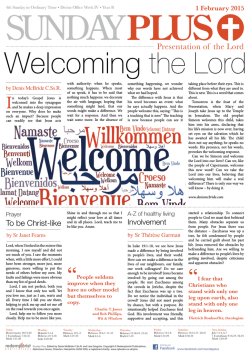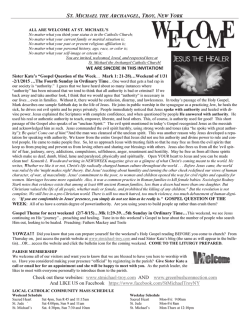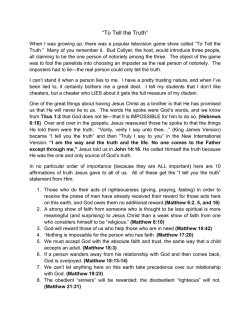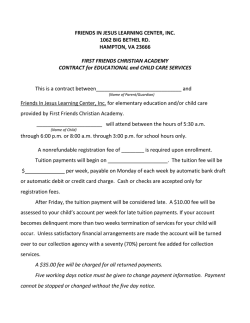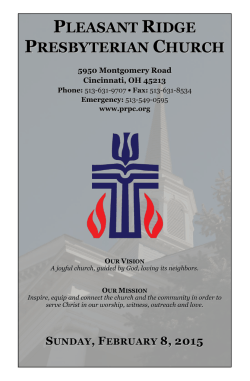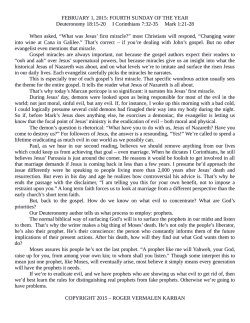
SD 2015 Booklet web - Self denial appeal 2015
SELF DENIAL APPEAL 2015 “This is what the kingdom of God is like. A man scatters seeD on the ground. Night and day, whether he sleeps or gets up, the seed sprouts and grows, though he does not know how” The Kingdom comes, meaning we have hope and the world has hope. We may not know how the Kingdom grows, but we do know that we, like the farmer, are called to action, to scatter the seeds and to do our part while trusting God to do his. Mark 4:26-29, New International Version General William Booth launched the first Self Denial Appeal in 1886. Since 1969 Salvationists have been challenged to give one week’s salary to support the appeal. Please give generously. Week 1 INTRODUCTION “They were like sheep without a shepherd.” Read Mark 6:30-34 In January 1879, William Booth wrote an article urging his soldiers to embrace their new name of The Salvation Army as well as their calling as Salvationists: “Be a Salvationist. Look at this. Clear your vision. Halt, stand still and afresh and more fully apprehend and comprehend your calling. You are to be a worker with God for the salvation of others. What is the business of your life? Not merely to save your soul and make yourself good enough for Paradise? If this were all, would it not be an ignoble and selfish lot for which to toil and suffer and pray and die, and would it not be as unlike the Master’s as could well be conceived of? No, you are to be a redeemer, a saviour, a copy of Jesus Christ himself. Rescue the perishing. There they are all around you everywhere, crowds upon crowds and multitudes” (The Salvationist, January 1879, alt). We have a clear responsibility to care for others in our world – to work for the benefit of others. Just before Mark describes the story of Jesus feeding the five thousand, he tells another story when Jesus asked his disciples to come with him and “get some rest” (Mark 6:32). Jesus and his disciples set off by themselves in a boat to somewhere quiet but when they landed, people were there, waiting for and needing Jesus to minister to them. So he did, because “they were like sheep without a shepherd” (Mark 6:34). He met the people’s needs because their needs were great and he could do something about it. And we should too! One of the great strengths of the Army is that we are a community – a global community that intersects with a myriad of other communities around the world. We have the resources to meet the needs of these communities and we must do so. We have a clear responsibility to care for others in our world – to work for the benefit of others. We are called to be co-workers with God for the salvation of others. We are called to play our part and we can trust God to play his. We are called to give generously because we are the blessed children of a generous Father. Let’s seek to do our part and give to the work of the Army around the world. God will use our generosity when we do. Prayer Loving Father God, I thank you for every blessing. I thank you for calling me to be a worker in your world for your glory. Help me to lift my eyes from my own concerns and help me see the needs of those who are sheep without a shepherd. Amen. We are called to give generously because we are the blessed children of a generous Father. week 2 Pakistan “You give them something to eat.” Read Mark 6:35-44 The feeding of the five thousand is one of the most famous and awe-inspiring Jesus’ miracles. While we might marvel at Jesus, it was not the disciples’ finest moment. It’s true that the disciples were worried that the people had nothing to eat. However, their solution was not quite as generous as we might hope. “Send them away,” they said to Jesus. “The people can look after themselves,” they thought. But Jesus, rather disconcertingly, replied, “You give them something to eat.” “We can’t afford that,” the disciples protested. So Jesus asked them to find out what food they did have. In fact he commanded it: “go and see.” Of course it wasn’t much. It was merely the meagre lunch of a little boy. But later, as they picked up twelve baskets of left-overs, I’m sure the disciples were once again amazed at what their Lord could do with such a small offering. Perhaps we would like to imagine that we would be the little boy in the story. It would be nice to think that we would give away all we had in that moment – to trust Jesus to do something extraordinary. But it’s also possible that we are much more like the disciples: “send them away, I can’t afford that.” After all, to dismiss the plight of the hungry is an easier conviction to live by than the command, “you give them something to eat”. If only the command wasn’t the words of Jesus. It would be nice to think that we would give away all we had in that moment – to trust Jesus to do something extraordinary. We could see poverty in rural Pakistan as someone else’s problem, wish them well and send them on their way. But perhaps the Lord is looking directly at us, asking us to “give”. Giving someone the money for a donkey might not mean much to us. But the amazing thing is that when we do give, extraordinary things can happen. Our money becomes a donkey, which becomes bricks which becomes food for a whole family. Perhaps we need to remember that the same Lord and Saviour who worked a miracle through a small boy’s generosity is at work in our offering as well. Prayer Lord, challenge me to see and care about the hungry in our world and help me to play my part, small though it may be, in helping them to eat. Amen. Our money becomes a donkey, which becomes bricks which becomes food for a whole family. week 3 Cambodia “Some people brought a blind man to Jesus and begged Jesus to touch him.” Read Mark 8:22-23 This is a great Bible story. Jesus’s miracle is extraordinary. To be an onlooker at an actual miracle would be an amazing thing. Imagine watching a disabled person be healed before your eyes. That would be awesome in the very best sense of the word. Perhaps the best part of this story is those unnamed “some people”. After all, the story is not possible without them. They didn’t just ask, they begged Jesus to touch the blind man in the hope that he would be healed. They saw a member of their community in need of healing and they brought him to Jesus. Conviction and courage laced with faith is a powerful mixture in the hands of God. A group of Korean Salvationists, who are an example of “some people”, on a mission trip to Cambodia, saw a community in need. One member from the group felt so convicted by the need, he started a hostel for young students. His faith and courage not only provided a home for students but also teachers and therefore an education to the poorest of the poor in Phnom Penh. Because of this series of events a young student’s life was changed. This student gave his life to God and now wants to serve God as a Salvation Army officer. And so the Kingdom grows although we do not know how. Certainly we could not predict the outcome or know exactly what God will do with our conviction and courage. We do know, however we are called to be one of the “some people” – the ones who see a need and respond because the cause is urgent and the need is great. The persistence of those who brought their blind friend to Jesus led to his sight being restored. Once again we see this principle at work –when we do our part for the kingdom by scattering the seeds, we can trust God to do his. ... when we do our part for the kingdom by scattering the seeds, we can trust God to do his. Prayer Lord, renew my faith. Help me to trust you to work in and through me and in and through my actions. May your kingdom come and may I do all that I can for your kingdom cause. Amen. week 4 Rwanda “The woman was a Greek, born in Syrian Phoenicia. She begged Jesus …” Read Mark 7:24-30 I cannot imagine living in a country, torn apart by ethnic violence. Tribe and clan pitted against each other. The wounds run deep in many families. Yet for a country that is filled with violence, in Rwanda there is hope – deep hope. Cedric is a little boy who is a part of a family who has seen violent death, knows what it is to be a refugee and knows what it is like to be hungry and marginalised. Yet to see him sitting in a Salvation Army pre-school, in his Salvation Army village, is to see a picture of hope. His mum’s life is hard but her love for her children is evident. Hope transcends and transforms community boundaries, it creates new communities. Hope heals and restores. In Mark’s gospel we read a strange story of Jesus’s interaction with a woman who was not part of his tribe and clan. It’s unusual because at first, Jesus says he will not heal her daughter. Apparently because the woman was not Jewish and his first missional priority was to his own people. Whatever the reason, it does not appear to be a hopeful response from Jesus. But the woman was not deterred. She did not try to argue with Jesus but rather bravely responded with an “even so” answer. She did not give up hope. She was desperate and persistent and she needed Jesus to hear her. And her brave hope was rewarded. “For such a reply”, Jesus says, “your daughter is healed.” Hope transcends and transforms community boundaries, it creates new communities. Hope heals and restores. It is easy in an affluent Western country to make judgements about cause and effect for those who are not like us, those in desperate need – the refugees, outcasts and the marginalised. It’s easy to decide that they don’t deserve our help. But the gospel calls us to answer their “even so”. William Booth spoke about the poor and destitute in one of his few recorded speeches and said: “Brought it on themselves you say? Quite likely. But that does not excuse our assisting them.” Perhaps we need to set aside the excuses we tell ourselves to hear more clearly the “even so” of the desperate. Prayer Lord, help me to see and to hear the pleas of the refugee, the poor and marginalised. Help me to respond in a loving way that brings hope and healing for them. Amen. It’s easy to decide that they don’t deserve our help. But the gospel calls us to answer their “even so”. week 5 papua new guinea “Deny yourself, take up your cross and follow me.” Read Mark 8:34-38 One of the mistakes we make as Christians is to confuse suffering and evil. It’s strange really because there is no doubt that Jesus modelled and called us to suffering. “Take up your cross,” he said. His listeners had no doubt about what taking up one’s cross meant in first century Roman Empire. Jesus suffered, Peter suffered, Paul suffered and Stephen suffered. The roll call of Christians who have suffered is a long and convincing list. That is where keeping suffering and evil as separate terms will help us. Yes they are connected, but they are not the same. Evil is often the cause of suffering. Evil is destructive, it stunts and prevents growth, but suffering does not. In fact the great testimony of the Christian faith is that we can flourish even in the midst of suffering. Freda lives in Papua New Guinea. She is HIV positive and so is her little girl – not through any fault of her own. She has also been neglected and been refused help by her people. In Freda’s culture the “wantok”, the clan, the care of one’s own, is the glue that holds society together. She is truly alone. And yet here is a story of hope. In fact the great testimony of the Christian faith is that we can flourish even in the midst of suffering. She is not diminished by her suffering. Freda has found hope in a loving Salvation Army community who helped her and her daughter to flourish, even in their suffering. Hope is rather a glorious thing. For we who are pretty much suffering free, it’s impossible to not be humbled, feel grateful and be challenged by Freda’s story. Hope redeems our suffering. We are called to be agents of hope – to do all we can to help those who are suffering, to flourish in spite of their circumstances. We are called to be agents of hope... Prayer Dear Lord, I thank you because in you there is hope. You can redeem our suffering. Your resurrection life is my resurrection hope. Help me to do all I can to live as a person of hope and to spread your hope. Amen. week 6 ALTAR SERVICE SUNDAY “You are not far from the kingdom.” Read Mark 12:29-34 We are bound together as a people of God. We are bound together by the love of God. Not just because we all love him, like football fans united by love of their team. No, God’s holy love is also in us – in our hearts, minds and souls. And that same love flows outwards in our love of others. Oh, it’s true, we may not always feel loving towards others. But perhaps if we’re honest, we can say that we don’t always feel loving towards God. But what we do know is that the “dispositions of our heart”, as John Wesley said, our very being, is and must always be, inclined towards God and towards others – a deep love for God and deep love for our neighbour. Practical love is a rather glorious expression of the Kingdom. Now it would be a very strange love that didn’t lead towards love in action. Imagine if you loved someone and never told them, helped them, spoke to them or cared for them. Love requires something of us. The love of God in our hearts certainly requires something of us. We have an amazing message of hope. We need to share the good news of the Kingdom with our neighbours. We need to share it in every way possible, or at least help our fellow Salvationists share it. As The Salvation Army we are part of a big community and that means we have a lot of neighbours. And that’s a good thing! And you and I must do what we can to bring Kingdom hope to people’s lives. And that’s not just words of hope but tangible hope that takes the shape of huts, wells, goats and schools, and is seen and felt in love and laughter in hope-filled communities. Practical love is a rather glorious expression of the Kingdom. We, who are materially blessed, must do all we can to express our hope and love by giving generously and sacrificially to our neighbours. And when we do, the Kingdom is near – it takes root and grows all by itself. Prayer Loving God, who first loved me and whose love transforms me, help me to give generously and sacrificially to your work, to help your message of hope spread through the whole world. Take my offering and use it for your kingdom purposes, I pray. Amen. We, who are materially blessed, must do all we can to express our hope and love by giving generously and sacrificially to our neighbours. together as one Freedom takes the burden of the outcast Lifting up the head of all who come They’re finding hope They’re finding hope Secure in the fullness of Your mercy The weary are restored in Your embrace Invited home Invited home The Saviour’s love is refuge for the hurting A welcome shelter, rescue from the storm All fear erased All fear erased Drawn by Your love Chains are broken All will find a place in You CHORUS Drawn by Your love Chains are broken All will find a place in You CHORUS United we’ll stand, a light in the dark Reaching the lost, and those in need Hope through community and sharing Your love We’ll stand together as one There is hope for the hopeless There is light in the darkness There is peace for the restless In You CHORUS Chris Smartt is a Sydney-based songwriter, performing artist, and producer. Having grown up attending Salvation Army churches both in Australia and Canada, Chris developed a strong value for the role that music and creative expression plays during corporate worship in helping people connect and deepen their relationship with God. Chris’ passion for music has always been framed within his faith. As a committed Christian, Chris sees his music as an extension of his ministry and he writes music that reflects and shares the hope, grace, and peace that is found in Jesus. Chris is currently collaborating with other Christian song writers and writing worship songs for his church as well as writing new music for his next EP to be released in 2015. Thanks to Captain Grant Sandercock-Brown - Devotional Writer Peter March & Michelle Watts - Video Producer / Director Rebecca Wright - Video Production Assistant David Scarborough - Editor Rod Allen - Children’s material Emma Park - Graphic Design “Together as One” recorded at Music Entourage, Sydney. Producer: Michael Fatkin Songwriters: Christopher Smartt & Michael Fatkin Mixing: Ben Whincop Mastering: Matthew Grey www. SELFDENIAL. info
© Copyright 2026
